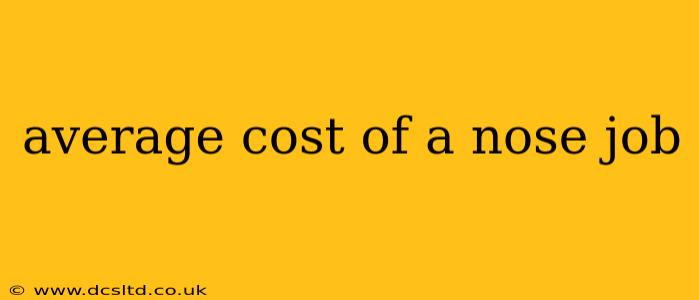Rhinoplasty, commonly known as a nose job, is a surgical procedure that alters the shape of the nose. The cost varies significantly depending on several factors, making it crucial to understand the price breakdown before committing to the procedure. This comprehensive guide explores the average cost of a nose job and the elements that influence its final price.
What is the average cost of a nose job in the US?
The average cost of a nose job in the United States ranges from $5,000 to $15,000. This is a broad range, and the actual cost can be considerably higher or lower depending on several factors detailed below. Keep in mind that this cost typically only covers the surgeon's fee. Anesthesia, facility fees, and other related expenses will add to the overall cost.
What factors influence the cost of a nose job?
Several factors contribute to the variability in nose job costs. Understanding these factors helps you better prepare for the financial commitment:
1. Surgeon's Experience and Reputation:
The surgeon's experience and reputation heavily influence the cost. Highly experienced and renowned surgeons with extensive training and a strong track record command higher fees. Their expertise and skill often justify the higher price, but it's essential to research and choose a surgeon based on skill and not solely price.
2. Geographic Location:
The cost of living and the overall market in your geographic location significantly impacts pricing. Nose jobs in major metropolitan areas with a high cost of living tend to be more expensive than those in smaller towns or rural areas.
3. Complexity of the Procedure:
The complexity of the surgery directly affects the cost. A simple reshaping of the nasal tip will cost less than a more complex procedure involving bone restructuring, septal repair (to correct breathing problems), or grafts. More extensive procedures require more time and expertise, translating to higher fees.
4. Anesthesia Fees:
Anesthesia fees are separate from the surgeon's fees and vary based on the type of anesthesia used (general vs. local) and the duration of the procedure.
5. Facility Fees:
The surgical facility's fees also contribute to the total cost. Ambulatory surgical centers and hospitals have varying pricing structures.
6. Pre- and Post-Operative Care:
Costs associated with pre- and post-operative appointments, tests, and medications add to the overall expenses.
What are the additional costs associated with a nose job?
Beyond the surgeon's fee, anticipate additional costs including:
- Anesthesia: This can range from a few hundred to over a thousand dollars.
- Facility fees: These vary greatly depending on the location and type of facility.
- Medications: Prescription medications for pain management and antibiotics.
- Follow-up appointments: Multiple post-operative check-ups are essential.
- Possible revision surgery: While not always necessary, revision surgery can be a significant added expense.
How can I find affordable rhinoplasty options?
While finding an affordable nose job shouldn't compromise quality or safety, you can explore these options:
- Research surgeons and compare fees: Request consultations with multiple surgeons to compare costs and services.
- Consider less expensive geographic locations: If travel is feasible, a less expensive area may offer comparable surgical expertise at a lower price.
- Inquire about financing options: Many surgeons or medical facilities offer payment plans or financing options.
Is it possible to get a nose job with insurance coverage?
Insurance typically doesn't cover cosmetic rhinoplasty. However, if the procedure is medically necessary to correct a breathing problem or a birth defect, insurance may cover a portion of the costs. You will need to check with your insurance provider to determine your coverage.
This information is for general knowledge and does not constitute medical advice. Always consult with a qualified plastic surgeon for personalized guidance and cost estimates. Remember, choosing a surgeon based on price alone should never take precedence over their skill, experience, and reputation. Prioritize safety and quality over cost when making such an important decision.
